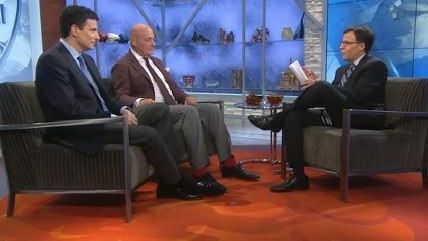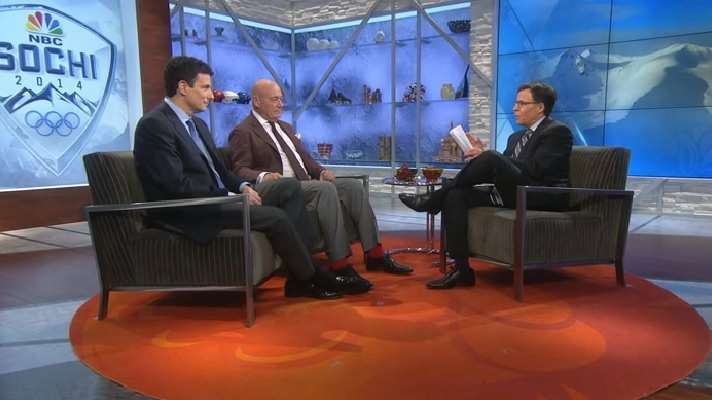As Sochi Olympics Open, Four Gay Activists Arrested in St. Petersburg
NBC's opening coverage doesn't avoid the various controversies


A small group of activists wanted to protest the treatment of gays under current Russian law. They hoped to unfurl a banner on a bridge Friday in St. Petersburg quoting the Olympic Charter's language against discrimination. They were, instead, detained by police. The reports seem to vary. The Associated Press reports that they were rounded up by police after unfurling the banner. However, according to BuzzFeed, police stopped the protesters while they were on their way to the bridge, indicating they already knew what they were planning somehow:
An LGBT activist who witnessed the arrests told BuzzFeed from St. Petersburg that the four protestors had stopped on their way to a bridge leading to the picturesque Vasilyevskiy Ostrov neighborhood to take some pictures when they were suddenly surrounded by police cars. The arrival of the police was so sudden that activists had no idea how they had even learned of the planned protest.
"Either the phones are being listened to or maybe there are cameras all over the city; only a few people knew about this action," said the activist, who asked to remain anonymous out of fear for her safety.
The activists involved knew there was a risk of arrest, but didn't expect a confrontation with police officers until they reached the bridge, the activist added.
I guess even Russians can still be surprised at how much the government is monitoring them.
Though the Olympics officially open tonight, a major expansion in the number of events prompted competition and coverage to begin Thursday. Observers wondered how much NBC would be willing to discuss the various controversies surrounding the Olympics. It turned out they were indeed quite willing, at least at the moment while the schedule isn't too hectic. Announcer Bob Costas brought up the anti-gay controversy almost immediately in the introduction of the evening's coverage and later brought out experts David Remnick and Vladimir Pozner to discuss the political landscape. The pair of them make the very important points that: One, Vladimir Putin cares about how the Russians evaluate the success of the Olympics, not America or Europe (terrorism is his major concern, not activism); and two, the vast majority of Russian people really, really, really don't like the gays. Watch the interview here.
Editor's Note: As of February 29, 2024, commenting privileges on reason.com posts are limited to Reason Plus subscribers. Past commenters are grandfathered in for a temporary period. Subscribe here to preserve your ability to comment. Your Reason Plus subscription also gives you an ad-free version of reason.com, along with full access to the digital edition and archives of Reason magazine. We request that comments be civil and on-topic. We do not moderate or assume any responsibility for comments, which are owned by the readers who post them. Comments do not represent the views of reason.com or Reason Foundation. We reserve the right to delete any comment and ban commenters for any reason at any time. Comments may only be edited within 5 minutes of posting. Report abuses.
Please to post comments


Russia is homophobes.
During the rundown of important events in Vladimir Putin's reign Bob Costas forgot to mention the Russian invasion of Georgia.
Invading a small neighboring country just doesn't count to NBC...
Costas mentioned the first protest witnessed AT the Games was when a Russian snowboarder, after his qualifying run, displayed the bottom of his board which had a masked personage of someone supposedly representing Pussy Riot. I was just pleased he said Pussy Riot on network TV.
They shouldn't have discussed their plans while in the hotel room shower.
The feeling is mutual.
I used to listen to Vladimir Pozner on Radio Moscow, don't think I ever saw his face until now. He was excellent at trying to sell the unsaleable in those days.
It was probably the first time I heard Pozner speak English. He has less of an accent when he speaks English than Russian.